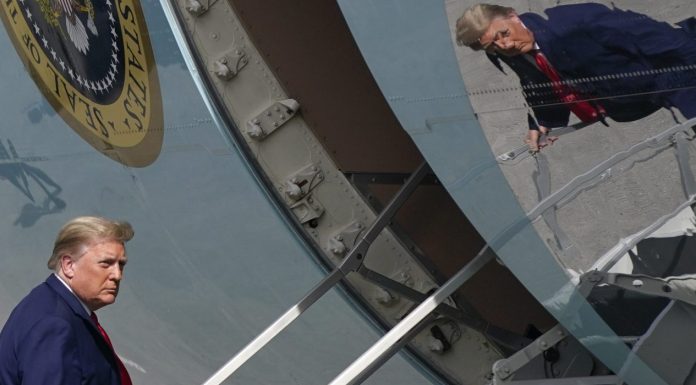(Headline USA) President Donald Trump on Thursday extended pandemic-related bans on green cards and work visas to large groups of applicants through March 31, while a federal appeals court sided with him on a rule that requires new immigrants to have their own health insurance.
The twin developments on the final day of 2020 encapsulated how Trump has made U.S. immigration policy more restrictive without support from Congress.
President-elect Joe Biden has promised to undo many of Trump’s actions but it is unclear how quickly and even to what extent.
Many of Trump’s policies were, in fact, reversals of those established during the Obama administration, although the widespread use of judicial injunctions to block those policies has been a more recent development during the Trump era.
That could make it more difficult to undo executive orders than in the past, since those that have succeeded now have the force of law behind them even without legislative action.
Federal judges had previously sought to block the pandemic-related visa bans, which were set to expire Thursday.
Biden, who is now forced to decide when and whether to lift them after taking office Jan. 20, doesn’t specifically address the issue in his immigration platform.
Biden also doesn’t directly address the health-insurance requirement in his platform, and a lawyer who sued over the policy on Thursday urged him to immediately rescind it.
In April, Trump imposed a ban on green cards issued abroad that largely targets family members of people already in the United States.
After a surprisingly chilly reception from immigration hawks, the administration went much farther in June by adding H-1B visas, which are widely used by American and Indian technology company workers and their families; H-2B visas for nonagricultural seasonal workers; J-1 visas for cultural exchanges; and L-1 visas for managers and other key employees of multinational corporations.
Trump said the measures would protect American jobs in a pandemic-wracked economy, while some leftist business groups said they would hamper a recovery.
“The effects of COVID-19 on the United States labor market and on the health of American communities is a matter of ongoing national concern,” Trump’s proclamation Thursday read, highlighting the growing number of cases and states’ restrictions on businesses.
By contrast, the administration’s edict to immediately expel asylum-seekers and others who cross the border illegally from Mexico was justified on grounds of containing the coronavirus.
Biden signaled recently that he would not immediately rescind the “Remain in Mexico” policy, which courts have upheld.
A temporary ban on non-essential travel across the Mexican and Canadian borders was also done for public health. Canada recently reciprocated, saying all visitors to the country must quarantine and have a negative coronavirus test before entering the country.
In October, a federal judge in San Francisco ruled that the work-visa ban could not be enforced against groups that sued and their members, who represent much of the U.S. economy: the U.S. Chamber of Commerce, the National Association of Manufacturers, the National Retail Federation, technology industry group TechNet and Intrax Inc., which manages cultural exchange programs.
In December, a federal judge in Oakland, California, prevented the green-card ban from taking effect against families of 181 U.S. citizens and legal residents who sued.
In its ruling issued Thursday, a 9th Circuit Court of Appeals panel voted 2-1 to clear the way for Trump’s requirement that immigrants have health insurance.
New immigrants must demonstrate they can obtain coverage within 30 days and pay their medical expenses. A federal judge blocked the rule from taking effect almost immediately after it was announced in October 2019.
Judge Daniel P. Collins, a Trump appointee, wrote that the president acted within his authority, relying largely on the Supreme Court’s ruling that upheld Trump’s travel ban on several predominantly Muslim countries. He was joined by Judge Jay Bybee, who was appointed by President George W. Bush.
Judge A. Wallace Tashima, who was appointed by President Bill Clinton, dissented, calling the policy “a major overhaul of this nation’s immigration laws without the input of Congress—a sweeping and unprecedented exercise of unilateral Executive power.”
Esther Sung, an attorney for Justice Action Center, an advocacy group that sued to block the rule, said she was disappointed.
The ruling “makes clear that the Biden administration must move swiftly to rescind all of President Trump’s xenophobic presidential proclamations, including this health care ban,” she said.
The Justice Department did not immediately respond to a message seeking comment.
Adapted from reporting by the Associated Press

